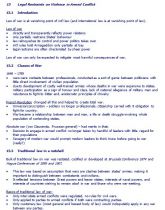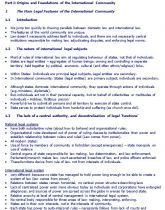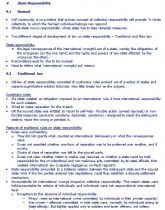Studijní materiál: Antonio Cassese - International Law
Skrýt detaily | Oblíbený- Kvalita:90,0 %
- Typ:Studijní materiál
- Univerzita:Univerzita Karlova v Praze
- Fakulta:Fakulta sociálních věd
- Kategorie:Humanitní vědy
- Podkategorie:Právo
- Předmět:Mezinárodní právo
- Autor:clean.bandit
- Ročník:3. ročník
- Rozsah A4:92 strán
- Zobrazeno:966 x
- Stažené:0 x
- Velikost:0,5 MB
- Formát a přípona:MS Office Word (.doc)
- Jazyk:anglický
- ID projektu:9371
- Poslední úprava:09.01.2017
Part I: Origins and Foundations of the International Community
1 The Main Legal Features of the International Community
1.1 Introduction
• We jump too quickly to drawing parallels between domestic law and international law.
• The features of the world community are unique.
• Law doesn’t necessarily address itself to individuals, and there are not necessarily central institutions responsible for making law, adjudicating disputes, and enforcing legal norms.
1.2 The nature of international legal subjects
• Most of rules of international law aim at regulating behaviour of states, not that of individuals.
• States are legal entities - aggregates of human beings, owning and controlling a separate territory, held together by political, economic, cultural (and often ethnic/religious) links.
• Within States: Individuals are principal legal subjects, Legal entities are secondary.
• In International community: States (legal entities) are primary subject, individuals are secondary.
• Although states dominate international community, they operate through actions of individuals (e.g. ministers, diplomats).
• But, individuals act not in their personal capacity, but on behalf of collectivities or multitudes of individuals - Hobbes, ‘fictitious person’
• Powerful drive to submit all persons and all territory to exercise of state control.
• State serves to protect individuals from hardship and suffering (as church once did).
1.3 The lack of a central authority, and decentralisation of legal ‘functions’
National legal systems
• have both substantive rules (about how to behave) and organisational rules.
• Organisational rules developed out of power of ruling classes to institutionalise their power and establish relationship between rulers and ruled (Law comes from power).
• All modern states:
• Use of force by members of community is forbidden (except emergencies) - state monopoly on use of violence
• Central organs of state responsible for law making, law determination, and law enforcement. Parliament/monarch makes law, court ascertained breaches of law, and police officers enforced.
• These functions derive from rule of law, not from interests of individuals.
1 The Main Legal Features of the International Community
1.1 Introduction
• We jump too quickly to drawing parallels between domestic law and international law.
• The features of the world community are unique.
• Law doesn’t necessarily address itself to individuals, and there are not necessarily central institutions responsible for making law, adjudicating disputes, and enforcing legal norms.
1.2 The nature of international legal subjects
• Most of rules of international law aim at regulating behaviour of states, not that of individuals.
• States are legal entities - aggregates of human beings, owning and controlling a separate territory, held together by political, economic, cultural (and often ethnic/religious) links.
• Within States: Individuals are principal legal subjects, Legal entities are secondary.
• In International community: States (legal entities) are primary subject, individuals are secondary.
• Although states dominate international community, they operate through actions of individuals (e.g. ministers, diplomats).
• But, individuals act not in their personal capacity, but on behalf of collectivities or multitudes of individuals - Hobbes, ‘fictitious person’
• Powerful drive to submit all persons and all territory to exercise of state control.
• State serves to protect individuals from hardship and suffering (as church once did).
1.3 The lack of a central authority, and decentralisation of legal ‘functions’
National legal systems
• have both substantive rules (about how to behave) and organisational rules.
• Organisational rules developed out of power of ruling classes to institutionalise their power and establish relationship between rulers and ruled (Law comes from power).
• All modern states:
• Use of force by members of community is forbidden (except emergencies) - state monopoly on use of violence
• Central organs of state responsible for law making, law determination, and law enforcement. Parliament/monarch makes law, court ascertained breaches of law, and police officers enforced.
• These functions derive from rule of law, not from interests of individuals.



